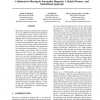Free Online Productivity Tools
i2Speak
i2Symbol
i2OCR
iTex2Img
iWeb2Print
iWeb2Shot
i2Type
iPdf2Split
iPdf2Merge
i2Bopomofo
i2Arabic
i2Style
i2Image
i2PDF
iLatex2Rtf
Sci2ools
UAI
2000
2000
Collaborative Filtering by Personality Diagnosis: A Hybrid Memory and Model-Based Approach
The growth of Internet commerce has stimulated the use of collaborative filtering (CF) algorithms as recommender systems. Such systems leverage knowledge about the known preferences of multiple users to recommend items of interest to other users. CF methods have been harnessed to make recommendations about such items as web pages, movies, books, and toys. Researchers have proposed and evaluated many approaches for generating recommendations. We describe and evaluate a new method called personality diagnosis (PD). Given a user's preferences for some items, we compute the probability that he or she is of the same "personality type" as other users, and, in turn, the probability that he or she will like new items. PD retains some of the advantages of traditional similarity-weighting techniques in that all data is brought to bear on each prediction and new data can be added easily and incrementally. Additionally, PD has a meaningful probabilistic interpretation, which may be...
Meaningful Probabilistic Interpretation | Method Called Personality | Such Systems Leverage | UAI 2000 | UAI 2008 |
| Added | 01 Nov 2010 |
| Updated | 01 Nov 2010 |
| Type | Conference |
| Year | 2000 |
| Where | UAI |
| Authors | David M. Pennock, Eric Horvitz, Steve Lawrence, C. Lee Giles |
Comments (0)

